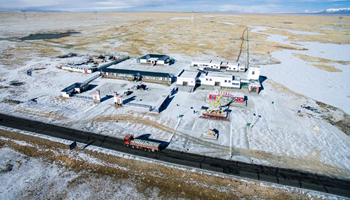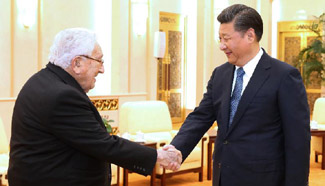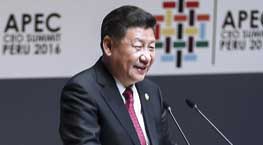TEHRAN, Dec. 2 (Xinhua) -- The Iranian Foreign Ministry said Friday that the U.S. Senate's vote to extend sanctions against the Islamic republic is a violation of an international deal on Iran's nuclear issue clinched in July 2015.
"As it was repeatedly announced by senior Iranian officials, the recent decision by the U.S. House of Representatives and Senate to extend sanctions against Iran runs counter to the Joint Comprehensive Plan of Action (JCPOA)," said Foreign Ministry Spokesman Bahram Qasemi.
"It is also against the U.S. obligations under international law on non-interference in domestic and international relations of other countries," Qasemi was quoted as saying by Press TV.
Last week, the U.S. House of Representatives voted for the extension of the Iran Sanctions Act (ISA) for another 10 years, which was endorsed by the U.S. Senate on Thursday.
The bill has still to be signed by the U.S. president to become a law.
The ISA was first adopted in 1996 to sanction Iran over its controversial nuclear program.
Qasemi said Friday that "the political developments inside the U.S. and interactions between its legislative and executive branches cannot justify the country's failure to abide by its international commitments."
Iran has already proved its commitment to international agreements, he said, with necessary preparations to "effectively, firmly and prudently safeguard the nation's rights."
The Iranian Foreign Ministry is closely monitoring the U.S. administration's conduct, and will present a report to the committee tasked with monitoring the JCPOA's implementation, he added.
Ali Akbar Salehi, the head of the Atomic Energy Organization of Iran (AEOI), said Friday that Iran is fully prepared to respond to the vote.
Salehi said that Iran will make no "emotional decisions" without "prudence, vigilance and wisdom," stressing Iran's national interests and sovereignty.
The new U.S. move is a "blatant violation" of last year's international nuclear agreement, which put an end to the disputes over Iran's nuclear program, he added.
He said that Iran has always made efforts to keep the JCPOA alive since it is a great and important achievement for Iran, the region and the international community.
He also expressed the hope that the U.S. officials would act according to their obligations.
Iran's Supreme Leader Ayatollah Ali Khamenei said last week that if the U.S. renews the ISA, the Islamic republic will "definitely" react.
Iran and six world major countries, namely the U.S., Britain, China, Russia, France and Germany, reached an agreement on the Iranian nuclear issue in July, 2015 that puts Iran on the path of sanctions relief but more strict limits on its nuclear program.
The deal sets limits on Iran's nuclear activities as it will take Tehran at least one year to produce enough fissile materials for producing a nuclear weapon, and allows regular inspections of the facilities inside Iran.
In return, the U.S. and the European Union will suspend nuclear-related sanctions against Tehran.
Many members of the U.S. Congress had expressed deep concern over the deal, warning that Tehran could evade inspections and use the money from sanction relief to destabilize the region.










